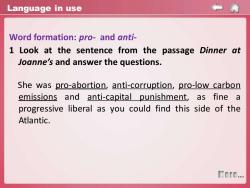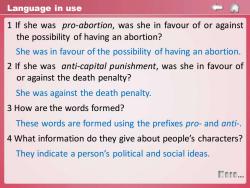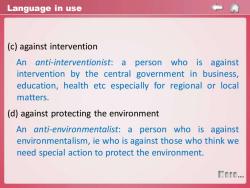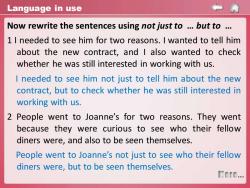《大学英语读写》课程教学资源(A)Ⅱ_大学英语读写(A)Ⅱ_Book3.Unit5.language in use

Languageinuse1 Form new words to describe someone2 Rewrite the sentences using not just to ... but to3Completethe sentences4 Look at the sentences and answer the questions5 Read the explanations and answer the questions6 Translate the paragraph into Chinese7 Translate the paragraph into English
Language in use 1 Form new words to describe someone 2 Rewrite the sentences using not just to . but to . 3 Complete the sentences 4 Look at the sentences and answer the questions 5 Read the explanations and answer the questions 6 Translate the paragraph into Chinese 7 Translate the paragraph into English

LanguageinuseWord formation:pro- and anti-1 Look at the sentence from the passage Dinner atJoanne'sand answerthe questions.She was pro-abortion, anti-corruption, pro-low carbonemissions and anti-capital punishment, as fine aprogressive liberal as you could find this side of theAtlantic.More
Word formation: pro- and anti- 1 Look at the sentence from the passage Dinner at Joanne’s and answer the questions. She was pro-abortion, anti-corruption, pro-low carbon emissions and anti-capital punishment, as fine a progressive liberal as you could find this side of the Atlantic. Language in use

Languagein use1 If she was pro-abortion, was she in favour of or againstthe possibility of having an abortion?She was in favour of the possibility of having an abortion.2 If she was anti-capital punishment, was she in favour ofor against the death penalty?She was against the deathpenalty3 How are the words formed?These words are formed using the prefixes pro-and anti-4 What information do they give about people's characters?Theyindicate aperson's political and socialideas.More
1 If she was pro-abortion, was she in favour of or against the possibility of having an abortion? She was in favour of the possibility of having an abortion. 2 If she was anti-capital punishment, was she in favour of or against the death penalty? She was against the death penalty. 3 How are the words formed? These words are formed using the prefixes pro- and anti-. 4 What information do they give about people’s characters? They indicate a person’s political and social ideas. Language in use

Language in useNow form new wordsto describe someone whois:(a) against racismAn anti-racist:a person who is against racism,ie againstthe belief that people of their own race are better thanthose of other races, and against the unfair and violenttreatment ofpeoplefromother races.(b)infavourofdevolutionperson who is in favour ofApro-devolutionist:adevolution of power, finance, decision-makingoneducation,health etc to regional or local administrativebodies,rather than keeping suchpowerand control withthecentralgovernmentMore
Now form new words to describe someone who is: (a) against racism An anti-racist: a person who is against racism, ie against the belief that people of their own race are better than those of other races, and against the unfair and violent treatment of people from other races. (b) in favour of devolution A pro-devolutionist: a person who is in favour of devolution of power, finance, decision-making on education, health etc to regional or local administrative bodies, rather than keeping such power and control with the central government. Language in use

Language inuse(c)againstinterventionAn anti-interventionist: a person whois againstintervention by the central government in business,education, health etc especially for regional or localmatters.(d)againstprotectingtheenvironmentAn anti-environmentalist: a person who is againstenvironmentalism,ie who is againstthose who think weneed special actionto protecttheenvironment.More
(c) against intervention An anti-interventionist: a person who is against intervention by the central government in business, education, health etc especially for regional or local matters. (d) against protecting the environment An anti-environmentalist: a person who is against environmentalism, ie who is against those who think we need special action to protect the environment. Language in use

Languageinuse(e) in favour of a market economyA pro-market economist: a person who is in favour ofletting market forces follow their own processes withminimal government intervention or control.(f)infavourofthegovernmentA pro-governmentalist:a person who is in favour of thegovernment'spoliciesand actionsEND
(e) in favour of a market economy A pro-market economist: a person who is in favour of letting market forces follow their own processes with minimal government intervention or control. (f) in favour of the government A pro-governmentalist: a person who is in favour of the government’s policies and actions. Language in use

Language in usenot just to...but to ...2 Look at the sentences.The shoppers on Fifth Avenue were in a hurry for tworeasons. They wanted to track down the last-minuteChristmas presents, and they wanted to escape thebitter cold and get home with their families forChristmas Eve.You canrewritethemlikethis:The shoppers on Fifth Avenue were in a hurry,not just totrack down the last-minute presents, but to escape thebitter cold and get home with their families for ChristmasEve.More
not just to . but to . 2 Look at the sentences. The shoppers on Fifth Avenue were in a hurry for two reasons. They wanted to track down the last-minute Christmas presents, and they wanted to escape the bitter cold and get home with their families for Christmas Eve. You can rewrite them like this: The shoppers on Fifth Avenue were in a hurry, not just to track down the last-minute presents, but to escape the bitter cold and get home with their families for Christmas Eve. Language in use

LanguageinuseNow rewrite the sentences using not just to ... but to ...1 I needed to see him for two reasons. I wanted to tell himabout the new contract, and I also wanted to checkwhether he was still interested in working with us.I needed to see him not just to tell him about the newcontract, but to check whether he was still interested inworkingwithus.2 People went to Joanne's for two reasons. They wentbecause they were curious to see who their fellowdiners were, and also to be seen themselves.People went to Joanne'snot justto see who their fellowdiners were, butto beseenthemselves.More
Now rewrite the sentences using not just to . but to . 1 I needed to see him for two reasons. I wanted to tell him about the new contract, and I also wanted to check whether he was still interested in working with us. I needed to see him not just to tell him about the new contract, but to check whether he was still interested in working with us. 2 People went to Joanne’s for two reasons. They went because they were curious to see who their fellow diners were, and also to be seen themselves. People went to Joanne’s not just to see who their fellow diners were, but to be seen themselves. Language in use

Languageinuse3 Matthew decided to climb Mount Kilimaniaro for tworeasons. Firstly, it was a personal challenge, andsecondly, he wanted to raise money for a children'scharity.Matthew decided to climbMountKilimanjaro not just toface this personal challenge, but to raise money for achildren'scharity.4 I agreed to go to Egypt for two reasons. I wanted to seean old friend, and I also needed a break from thenorthern winter.I agreed to go to Egypt not just to see an old friend, butto takea much-needed break fromthe northern winter.More
3 Matthew decided to climb Mount Kilimanjaro for two reasons. Firstly, it was a personal challenge, and secondly, he wanted to raise money for a children’s charity. Matthew decided to climb Mount Kilimanjaro not just to face this personal challenge, but to raise money for a children’s charity. 4 I agreed to go to Egypt for two reasons. I wanted to see an old friend, and I also needed a break from the northern winter. I agreed to go to Egypt not just to see an old friend, but to take a much-needed break from the northern winter. Language in use

Languageinuse5 Florence left home for two reasons. She couldn't find ajob in the area where she lived, and she was beginningto find family lifeoppressive.Florence left homenot just to findajob in this area, butto escapefrom family life,which she was beginning tofindoppressive.END
5 Florence left home for two reasons. She couldn’t find a job in the area where she lived, and she was beginning to find family life oppressive. Florence left home not just to find a job in this area, but to escape from family life, which she was beginning to find oppressive. Language in use
按次数下载不扣除下载券;
注册用户24小时内重复下载只扣除一次;
顺序:VIP每日次数-->可用次数-->下载券;
- 《大学英语读写》课程教学资源(A)Ⅱ_大学英语读写(A)Ⅱ_Book3.Unit6B.exercises.ppt
- 《基础日语》课程教学课件(PPT讲稿)第16課 春節.ppt
- 《基础日语》课程教学课件(PPT讲稿)第17課 コンサート.ppt
- 《基础日语》课程教学课件(PPT讲稿)第18課 病気 ユニット1 診察.ppt
- 《基础日语》课程教学课件(PPT讲稿)第18課 病気 ユニット2 お見舞い.ppt
- 《基础日语》课程教学课件(PPT讲稿)第18課 病気 ユニット3 読解文 高橋さんの日記.ppt
- 《基础日语》课程教学课件(PPT讲稿)第19課 黄砂 ユニット1.pdf
- 《基础日语》课程教学课件(PPT讲稿)第19課 黄砂 ユニット2 家族からの電話.pdf
- 《基础日语》课程教学课件(PPT讲稿)第19課 黄砂 ユニット3 読解文.pdf
- 《综合英语》课程教学资源Ⅲ_45669_课程资源_Translation exercises_Answers.doc
- 《综合英语》课程教学资源Ⅲ_45669_课程资源_词汇及释义_Unit 1.ppt
- 《综合英语》课程教学资源Ⅲ_45669_课程资源_词汇及释义_Unit 3.ppt
- 《综合英语》课程教学资源Ⅲ_45669_课程资源_词汇及释义_Unit 4.ppt
- 《综合英语》课程教学资源Ⅲ_45669_课程资源_词汇及释义_Unit 5.ppt
- 《综合英语》课程教学资源Ⅲ_45669_课程资源_词汇及释义_Unit 8.ppt
- 《综合英语》课程教学资源Ⅲ_45669_课程资源_词汇及释义_Unit 11.ppt
- 《综合英语》课程教学资源Ⅲ_45669_课程资源_词汇及释义_Unit 12.ppt
- 《综合英语》课程教学资源Ⅲ_45669_课程资源_Unit 11_Unit 11 预习课件.ppt
- 《综合英语》课程教学资源Ⅲ_45669_课程资源_Unit 8_Unit 8 预习课件.ppt
- 《综合英语》课程教学资源Ⅲ_45669_课程资源_Unit 5_Unit 5 预习课件.ppt
- 《大学英语读写》课程教学资源(A)Ⅱ_大学英语读写(A)Ⅱ_Book3.Unit5A.exercise.ppt
- 《大学英语读写》课程教学资源(A)Ⅱ_大学英语读写(A)Ⅱ_Book3.Unit3.language in use.ppt
- 《大学英语读写》课程教学资源(A)Ⅱ_大学英语读写(A)Ⅱ_Book3.Unit3A.exercises.ppt
- 《大学英语读写》课程教学资源(A)Ⅱ_大学英语读写(A)Ⅱ_Book3.Unit1A.课堂讨论课文所用课件.ppt
- 《大学英语读写》课程教学资源(A)Ⅱ_大学英语读写(A)Ⅱ_Book3.Unit1A.exercises.ppt
- 《大学英语读写》课程教学资源(A)Ⅱ_大学英语读写(A)Ⅱ_Book3.Unit1A.Text.ppt
- 《大学英语读写》课程教学资源(A)Ⅱ_大学英语读写(A)Ⅱ_Book3.Unit1A.words to note.ppt
- 《大学英语读写》课程教学资源(A)Ⅱ_大学英语读写(A)Ⅱ_Book3.Unit6B.text organization1..ppt
- 《大学英语读写》课程教学资源(A)Ⅱ_大学英语读写(A)Ⅱ_Book3.Unit6B.words to note.ppt
- 《大学英语读写》课程教学资源(A)Ⅱ_大学英语读写(A)Ⅱ_Writing:English Paragraph Development.ppt
- 《大学英语读写》课程教学资源(A)Ⅱ_大学英语读写(A)Ⅱ_Book3.Unit5A.text organization.pdf
- 《大学英语读写》课程教学资源(A)Ⅱ_大学英语读写(A)Ⅱ_Book3.Unit3.English paragraph writing.ppt
- 《大学英语读写》课程教学资源(A)Ⅱ_大学英语读写(A)Ⅱ_Book3.Unit3A.language points.ppt
- 《大学英语读写》课程教学资源(A)Ⅱ_大学英语读写(A)Ⅱ_Book3.Unit3A.text organization.ppt
- 《大学英语读写》课程教学资源(A)Ⅱ_大学英语读写(A)Ⅱ_Book3.Unit1.Writing1.ppt
- 《大学英语读写》课程教学资源(A)Ⅱ_大学英语读写(A)Ⅱ_Book3.Unit1A.language points.ppt
- 《大学英语读写》课程教学资源(A)Ⅱ_大学英语读写(A)Ⅱ_Book3.Unit8A.课文原文.ppt
- 《学科英语》课程教学资源(文献资料)预习阅读材料10.doc
- 《学科英语》课程教学资源(文献资料)预习阅读材料9.doc
- 《学科英语》课程教学资源(文献资料)预习阅读材料8.doc
